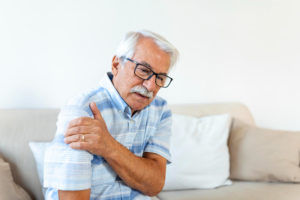Joint pain is a general symptom caused due to conditions like arthritis, bursitis, and tendinitis. It can also be a side effect of certain medications or an injury. Joint pain can range from mild to severe and may accompany other symptoms such as stiffness, swelling, and difficulty moving the affected joint.
There are many doctors in Panchkula. Dr Jyotiraditya is a joint pain doctor in Panchkula who treats joint pains with ayurvedic methods.

Factors causing joint pains
Many factors can cause joint pain, including:
- Arthritis: Arthritis is a common cause of joint pain caused by wear and tear and inflammations of the joints. There are several types of arthritis, including osteoarthritis, rheumatoid arthritis, and gout.
- Bursitis: Bursitis is a condition that occurs when the fluid-filled sacs (bursae) that cushion the joints become inflamed.
- Tendinitis: Tendinitis occurs when the tendons, the fibrous cords that attach muscles to bones, become inflamed.
- Injury to joint: Injury to the joint, sprains, strains or overuse may also result in joint pain.
- Autoimmune diseases: Some autoimmune diseases like lupus and rheumatoid arthritis can cause joint pains.
- Infections: Certain infections can cause joint pain, such as Lyme disease, a bacterial infection that spreads through tick bites.
- Obesity: Carrying extra weight puts more stress on the joints, especially the weight-bearing joints like hips, knees, and ankles.
- Genetics: Some people may be more prone to developing joint pain due to their genetic makeup.
- Age: As we age, the cartilage that cushions the joints wears down, leading to pain and stiffness.
- Certain medications: Certain medications like corticosteroids and blood thinners can cause joint pain as a side effect.
Presentation of joint pains
Joint pain can present in several ways, depending on the underlying cause. Some common presentations of joint pain include:
- Acute pain: Sudden and severe pain in the joint that precedes some injury or infection.
- Chronic pain: Pain that persists for long periods caused by conditions such as osteoarthritis and rheumatoid arthritis.
Stiffness: Joints may feel stiff and difficult to move, especially in the morning or after long resting hours. - Swelling: Joints may appear swollen and tender to the touch.
- Redness: The skin around the joint may appear red and warm to the touch, indicating inflammation.
- Limited range of motion: Joint pain can make it difficult to move the affected joint through its full range of motion.
- Crepitus: Some people may feel or hear a grating or crackling sound when moving the joint, indicating that the bones are rubbing together.
- Fatigue: Some people with joint pain may experience tiredness, weakness or a general feeling of malaise.
- Loss of function: Joint pain can make it difficult to perform everyday activities, such as climbing stairs or getting dressed.
It is important to note that joint pain may accompany other symptoms such as fever, weight loss, or rashes, which can suggest an underlying infection or autoimmune disorder.
Ayurvedic treatment for joint pains
Ayurveda offers several methods for managing joint pains. Panchakarma is a form of Ayurvedic medicine that aims to cleanse the body and restore balance to the mind and body. It includes a variety of treatments, such as ayurvedic oil massages, herbal remedies, and detoxification therapies. Some of the Panchakarma therapies used to treat joint pain include:
- Abhyanga: Abhyanga is an ayurvedic hot oil massage that involves medicated oils to soothe and nourish the joints and surrounding structures.
- Swedana: Swedana is a form of sweating or fomentation therapy that involves steam, herbal poultices (called potli therapies) or a sauna to promote sweating and remove toxins from the body.
- Virechana karma: Virechana karma is a form of purgation therapy that uses medicated ghritam (medicated clarified butter) and herbal laxatives to cleanse the body and reduce inflammation.
- Basti karma: Basti karma is administering medicated enema that uses herbal decoctions (kadha), oils, or ghritam (clarified butter) to cleanse the colon and nourish the joints.
- Raktamokshana: RaktaMokashan or bloodletting therapy that removes toxins from the blood and reduces inflammation. The very famous leech therapy comes under this category.
FAQ's
Can Ayurveda help in treating Rheumatoid arthritis?
Yes, Ayurveda treatment shows promising results while treating rheumatoid arthritis. It is advised to get the treatment for rheumatoid arthritis done only by a qualified ayurvedic doctor.
Can Ayurveda treat inflammations?
Yes, Ayurveda treatments have good results in reducing pain and inflammation. Various herbs and ayurvedic medicines have miraculous effects in reducing pain and inflammation.
Dr. Jyotiraditya Agarwal

Contact Us
Testimonials

Rahul Sharma
CIVIL ENGINEER
I am very satisfied with my back pain problem that is almost 100 % resolved by treatment done at Nidanam. My problem was almost 8 years old. I had consulted so many doctors but in vain… then came to know about this clinic and now my back pain is History.


Aditi Bose
DESIGNER
I am extremely happy with my Hair Treatment done by Dr. Bhavana. I was almost on the verge of getting bald. I started my Hair treatment at Nidanam and it took me 6 months to find my scalp full of hairs back. I am Very very happy with the results.


Pulkit Rastogi
CUSTOMER
I lost almost 27 Kg here at Nidanam. They don’t make you starve nor make you exercise hard. With their specialized diet plans along with weigh loss techniques I was able to shed off those Kgs..
